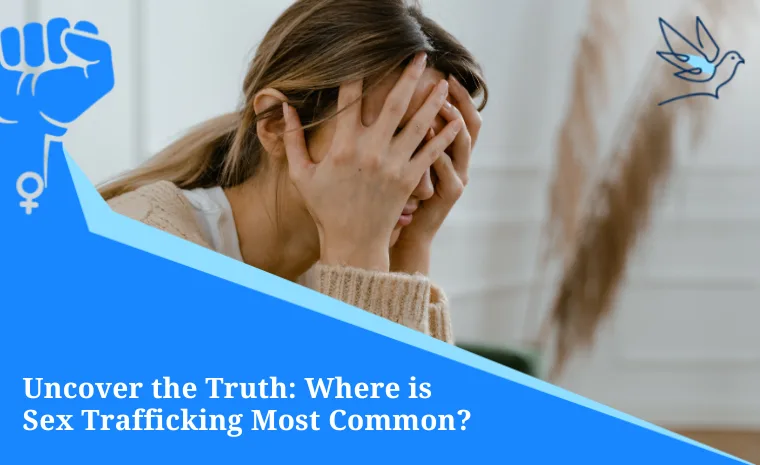Uncover the Truth: Where is Sex Trafficking Most Common?
Sex trafficking is a grave human rights violation that continues to plague societies around the world. While it may be tempting to believe that such heinous crimes only occur in far-off lands, the harsh reality is that sex trafficking is a pervasive issue right here in the United States. But where is sex trafficking most common?
In this blog, we will delve into the prevalence of sex trafficking in California, shedding light on the importance of raising awareness about this issue.
Understanding Sex Trafficking
Sex trafficking, along with its counterpart, labor trafficking, represents a grave violation of human rights. These illicit practices involve the illegal trade of human beings, often for purposes of exploitation, through the use of force, fraud, or coercion. Importantly, both forms of trafficking are criminal offenses under both state and federal laws in the United States.
Specifically, according to the California law, sex trafficking is defined as the sexual exploitation, sexual slavery, recruitment, harboring, transportation, provision, or obtaining of a person for the explicit purpose of engaging in a commercial sex act, all achieved through the means of force, fraud, or coercion.
It’s crucial to differentiate sex trafficking from related but distinct activities, such as prostitution. In the case of prostitution, individuals may willingly choose to engage in commercial sex for various reasons. In stark contrast, sex trafficking victims are subjected to manipulation, threats, or physical force, effectively coercing them into this trade against their will.
Understanding this distinction is vital, as it enables society to better combat these common forms of exploitation, protect victims, and bring perpetrators to justice.
The Prevalence of Sex Trafficking in California
California, with its vast population and diverse cities, has unfortunately emerged as a hotspot for sex trafficking. Recent human trafficking statistics reveal alarming figures, making US one of the worst countries for sex trafficking:
According to the National Human Trafficking Hotline, California consistently ranks among the top states for reported cases of trafficking.
- In 2021, out of the 399,494 contacts to the hotline via phone calls, emails, SMS, webchat, and online report, 44,942 are reporting possible human trafficking activities from California.
- The California 2021 report shows sex-related incidents highest at 7,499 cases. These human trafficking victims are forced to engage in illegal activities in venues like pornography, illicit massage parlors, and hotels.
- Victims are mostly women at 87% human trafficking rate.
Who Are the Potential Victims?
Victims of trafficking can come from all walks of life, regardless of age, gender, or background. However, several factors can significantly heighten an individual’s susceptibility to becoming a victim of this modern-day slavery.
These factors include:
- Poverty: Financial hardship can leave individuals desperate for opportunities and more susceptible to manipulation.
- Lack of Social Support: Isolation and lack of a strong support system can make it easier for traffickers to exert control over their targets.
- Substance Abuse Issues: Individuals struggling with substance abuse may be coerced or lured into trafficking situations due to their vulnerability and need for drugs.
- Previous History of Sexual Abuse: Victims who have experienced past sexual abuse may be more susceptible to traffickers who exploit their emotional scars.
- Immigrant Populations: Undocumented individuals or those with uncertain immigration status can be particularly vulnerable, fearing deportation or legal consequences if they seek help.
Human traffickers cunningly exploit these vulnerabilities to maintain a grip on their victims, making it essential to address these root causes to prevent and combat trafficking effectively.
Where is Sex Trafficking Most Common?
One disheartening aspect of sex trafficking in California is its prevalence in various settings. The places where sex trafficking is most common include online pornography, spa parlors, and residence-based locations. These environments provide sex traffickers with opportunities to exploit vulnerable individuals.
Here are some reasons for their prevalence in each of these contexts:
Online Pornography
- Anonymity: The internet offers a veil of anonymity for both consumers and producers of online pornography. This anonymity makes it easier for traffickers to operate discreetly and evade law enforcement.
- Global Reach: Online pornography can be accessed globally, enabling traffickers to exploit victims from different regions and attract customers worldwide.
- Financial Gains: Online pornography can be highly profitable, making it an attractive avenue for traffickers seeking to maximize their illicit gains.
Spa Parlors
- Front Businesses: Traffickers often use legitimate-looking spa parlors as fronts for their illegal activities. This façade helps them avoid suspicion and scrutiny.
- Controlled Environment: Spa parlors provide traffickers with a controlled environment, where they can manipulate and control victims without drawing attention.
- Rotating Victims: Traffickers may rotate victims between different spa locations, making it challenging for law enforcement to track and investigate their operations.
Hotels
- Discreet Transactions: Hotels offer a discreet setting for traffickers to conduct their activities, as guests’ privacy is respected.
- Transient Nature: The transient nature of hotel stays allows traffickers to move victims frequently, making it challenging for authorities to monitor their actions.
- Lack of Surveillance: Some hotels may have inadequate security measures, making it easier for traffickers to operate without detection.
Residence-Based Locations
- Hidden Nature: Residence-based locations, such as private homes, can operate in relative obscurity, making them difficult for authorities to detect.
- Control Over Victims: Traffickers in residence-based settings have more direct control over their victims’ movements and activities, further limiting opportunities for escape or intervention.
- Reduced Risk of Detection: The absence of regular foot traffic or scrutiny by neighbors can reduce the likelihood of these locations being discovered.
Understanding these dynamics is crucial in combating sex trafficking in these various settings. It requires coordinated efforts among law enforcement, communities, and advocacy groups to identify and support victims, dismantle trafficking networks, and raise awareness about the signs of exploitation in these diverse contexts.
The Importance of Raising Awareness
Raising awareness about sex trafficking in California is critical. By shedding light on this issue, we can:
- Encourage individuals to recognize the signs of trafficking and report suspicions to the authorities.
- Support organizations that provide assistance and resources to survivors.
- Advocate for stricter laws and policies to combat trafficking and protect victims.

Notable Cases and the Hidden Nature of the Problem
To emphasize the gravity of the issue, let’s examine some notable cases of sex trafficking in California. One such case involved a major human trafficking ring operating in the San Francisco Bay Area. In 2018, authorities uncovered a sex trafficking network that exploited vulnerable individuals, often luring them through promises of employment or a better life. These victims were then forced into prostitution, with hotels and motels serving as the primary venues for exploitation.
This case underscores the hidden nature of sex trafficking. Victims are often manipulated through psychological coercion or physical force, making it incredibly challenging for them to seek help or escape their traffickers. Fear, threats against their families, and addiction to drugs are just a few of the tactics used to maintain control.
The Role of Community and Law Enforcement
Addressing sex trafficking requires a coordinated effort between the community and law enforcement agencies. Recent efforts in California have included training for hotel and motel staff to recognize signs of trafficking, such as guests with little luggage, multiple visitors, or a reluctance to provide identification.
Furthermore, the state has increased penalties for those convicted of sex trafficking, providing stronger legal tools to prosecute traffickers and protect victims.
The Urgent Need for Support and Rehabilitation
Supporting survivors of sex trafficking is as crucial as preventing the crime itself. California has organizations and shelters dedicated to helping survivors rebuild their lives, providing essential services like counseling, job training, and safe housing.
Awareness campaigns and public education also play a vital role in empowering communities to identify potential victims and report suspicious activities. By fostering a culture of vigilance and compassion, we can make significant strides in the fight against sex trafficking.
FAQs on California Law and Sex Trafficking
Is domestic servitude seen in sex trafficking?
Yes, domestic servitude can be a form of sex trafficking. Domestic servitude refers to situations where individuals, often women and girls, are coerced, deceived, or forced into providing labor or services within private households, which may include sexual services. In such cases, victims are subjected to various forms of abuse and control, including physical and sexual abuse, manipulation, and restrictions on their freedom.
What are the penalties for sex trafficking in California?
The penalties for sex trafficking in California can be severe. Convictions can result in imprisonment, fines, and the requirement to register as a sex offender. The specific penalties vary depending on factors such as the victim’s age, the level of coercion used, and the defendant’s criminal history.
How can I identify potential cases of sex trafficking in my community?
Identifying sex trafficking can be challenging, but there are common signs to look out for. These include individuals who show signs of physical abuse, have a controlling person accompanying them, lack personal identification documents, or seem fearful and reluctant to speak. Suspicious activities in hotels or motels, such as numerous visitors at odd hours, can also be indicative of trafficking.
What should I do if I suspect sex trafficking in my area?
If you suspect sex trafficking in your area, it’s essential to report it to the authorities. Contact your local law enforcement or the National Human Trafficking Hotline at 1-888-373-7888. Do not attempt to intervene personally, as this can be dangerous. Your report can help trained professionals investigate and assist potential victims.
Are there any resources available for survivors of sex trafficking in California?
Yes, California offers various resources and support services for survivors of sex trafficking. These may include shelters, counseling, legal assistance, job training programs, and medical services. Organizations and nonprofits specializing in human trafficking support can guide survivors on the path to recovery and independence.
Taking Action for Your Rights
The prevalence of sex trafficking in California is the modern slavery we do not wish to exist, but it’s one we can confront together. Understanding the nature of this crime, raising awareness, and supporting survivors are essential steps in eradicating it from our communities. As individuals, we can educate ourselves and our loved ones about the signs of trafficking, and as a society, we can demand stricter laws and policies that protect the vulnerable and punish traffickers.
Remember that survivors of sex trafficking deserve justice and support. If you or someone you know has been a victim of sex trafficking, consider seeking legal assistance from a personal injury lawyer with experience in trafficking cases.
The Women’s Rights Group is an organization deeply committed to aiding individuals who have experienced sexual violence within commercial contexts. Our dedication to combating trafficking has been instrumental in supporting numerous women in accessing the crucial resources necessary for rebuilding their lives.
We can assist you in obtaining essential medical care and reliable legal representation. Please don’t hesitate to get in touch with us.
Call us at (844) 240-4967 to arrange a free and confidential consultation.
Together, we can make a difference and work towards a safer, more just society where the scourge of sex trafficking is eradicated.






